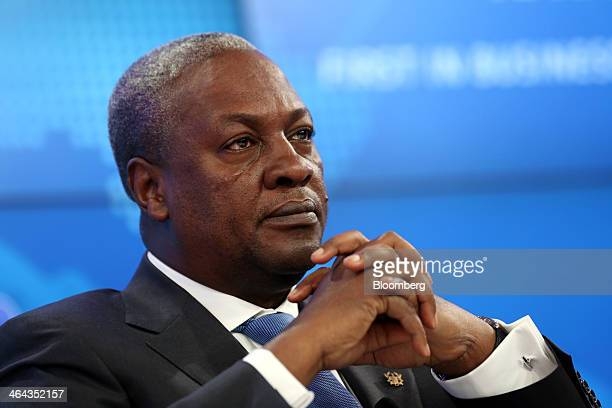John Dramani Mahama, Ghana’s president, pauses during a session on the opening day of the World Economic Forum (WEF) in Davos, Switzerland, on Wednesday, Jan. 22, 2014. World leaders, influential executives, bankers and policy makers attend the 44th annual meeting of the World Economic Forum in Davos, the five day event runs from Jan. 22-25. Photographer: Chris Ratcliffe/Bloomberg via Getty Images
The government of Ghana urgently needs liquidity to buy fuel to power its thermal plants (70% of electricity mix), but global oil prices have surged more than 7%, reaching $74.46 per barrel — the biggest single-day spike since Russia’s 2022 invasion of Ukraine.
The sharp rise follows large-scale Israeli airstrikes on Iran, targeting key nuclear facilities, ballistic missile sites, and top military commanders. Iran has promised a strong retaliation.
By midday Friday, Israel reported intercepting nearly 100 drones launched in response — a sign that tensions are far from over.
But why should Ghanaians care?
Iran borders the Strait of Hormuz — a narrow but vital passageway linking the Persian Gulf to the Arabian Sea.
Roughly 20% of the world’s oil supply — about 20 million barrels per day — flows through this corridor.
It serves as a crucial export route for oil giants like Saudi Arabia, Iraq, Kuwait, Iran, and the UAE, as well as Qatar’s liquefied natural gas.
Any threat to the free flow of tankers through this chokepoint spooks global energy markets almost instantly.
Following Israel’s initial strike, crude prices spiked as much as 13% before stabilising around a 7% gain.
Energy analysts say the market’s direction now hinges on Iran’s next move. If Tehran opts for a symbolic response, prices may level out.
But if oil infrastructure is targeted, the Strait blocked, or U.S. assets attacked, prices could soar by $20 or more per barrel.
For Ghana, this is not just another foreign policy headline — it’s an imminent economic shock.
The country relies entirely on imports for refined petroleum products, with its monthly fuel import bill averaging $400 million. A sustained rise in global oil prices will directly translate into higher costs at the pump.
This comes at a time when Ghanaians are bracing for the implementation of a proposed GH¢1 per litre fuel levy — now suspended. The government had banked on declining global oil prices and a stable cedi to support the new tax.
Officials were confident that subsequent pricing windows would favour consumers, buoyed by a strengthening local currency and lower crude benchmarks.
That assumption may no longer hold. The recent rally in oil prices risks wiping out the modest windfalls Ghanaians have seen at the pumps in recent months. If the trend continues, fuel prices could return to painful levels, triggering ripple effects across the economy, from transport fare hikes to rising costs of goods and services.
Fuel Levy Suspended
In a significant turn of events, the government has indefinitely suspended the implementation of the GH¢1 levy, which was scheduled to take effect on Monday, June 16, 2025.
The Ghana Revenue Authority (GRA), in a notice issued June 13, announced a postponement of the policy, citing the need for further technical and operational readiness. A new date is yet to be communicated.
While the official reason is administrative, the timing suggests deeper economic concerns. The move is widely seen as a response to heightened geopolitical risks and their potential impact on domestic fuel prices.
Cedi at Risk?
There’s also growing concern over the cedi’s stability. While the local currency has been the best-performing globally against the U.S. dollar this year, gaining over 40%, that trend could reverse.
Geopolitical uncertainty tends to spook investors and drive up demand for safe-haven currencies like the U.S. dollar. Higher import costs could further drain Ghana’s foreign reserves and exert pressure on the cedi.
So far, the cedi’s impressive performance has been supported by declining dollar demand, improved fiscal discipline, and strategic initiatives like the GOLDBOD programme, which backs the cedi with gold reserves. Tighter controls on remittance outflows have also played a role.
However, these gains could be tested if Middle East tensions persist. Ghana may have to rely more heavily on its domestic buffers — like GOLDBOD — to shield the economy from external shocks.
What Next?
Iran and Israel continue to trade missiles and air strikes, but for now, the world waits to see how long this conflict will last and the magnitude of damage it could cause.
Whether diplomacy prevails or the crisis escalates, the ripple effects are already reaching as far as Accra. The suspended GH¢1 fuel levy is perhaps the clearest sign yet that Ghana’s economic managers are bracing for volatility.
In the days ahead, how the government balances inflation pressures, fiscal needs, and public sentiment will be closely watched. But one thing is clear: the fallout from the Israel-Iran standoff could shape Ghana’s economic narrative in the second half of 2025 — and beyond.
DISCLAIMER: The Views, Comments, Opinions, Contributions and Statements made by Readers and Contributors on this platform do not necessarily represent the views or policy of Multimedia Group Limited.
DISCLAIMER: The Views, Comments, Opinions, Contributions and Statements made by Readers and Contributors on this platform do not necessarily represent the views or policy of Multimedia Group Limited.


